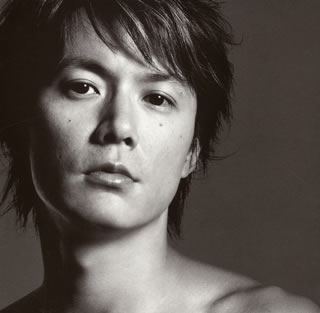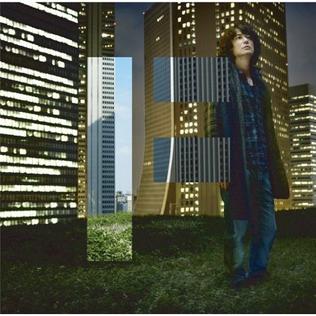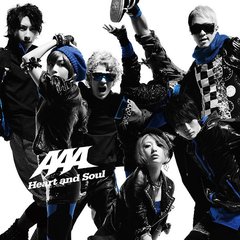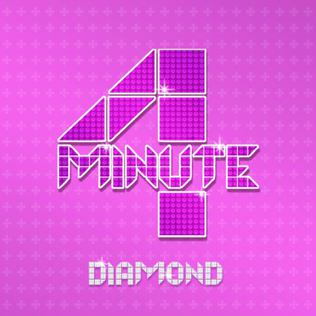
This is the discography of Dir En Grey, a Japanese metal band. They have recorded ten original studio albums, three EPs and thirty one singles in their twenty four years together. Each of the band's releases has charted on Japan's Oricon charts.
Uverworld is a Japanese rock band consisting of six members and originating from Kusatsu, Shiga. "Uverworld" is a term coined by the band members, combining the German word "über" with the English word "world" to form a phrase that means "crossing above the world". They have released nine studio albums and over twenty singles and have sold over three million records worldwide. The band's musical style was influenced by 1960s rock bands like The Beatles, The Zombies, and The Beach Boys, and later influenced by The Cookies, The Kinks, and The Cramps. Vocalist Takuya cited Frank Sinatra, Queen, David Bowie, Weezer, Green Day, and later My Chemical Romance as influences for the band.
Shūji to Akira was a special temporary unit formed by KAT-TUN member Kazuya Kamenashi and NEWS member Tomohisa Yamashita for their 2005 drama Nobuta o Produce. Shūji (修二) and Akira (彰) are the names of the characters Kamenashi and Yamashita play in the drama respectively. Although the drama has long finished on television, the duo have revived their performance of their song "Seishun Amigo" numerous times. In 2017, they formed another special temporary unit, Kame to Yamapi, for their 2017 drama Boku, Unmei no Hito desu.

The discography of Japanese R&B singer Misia consists of nine studio albums, three compilation albums, one extended play (EP), one live album, six remix albums, twenty-six singles, twelve promotional singles, eighteen video albums and thirty-seven music videos. In 1997, Misia signed a recording contract with BMG Japan and joined the then up-and-coming talent agency, Rhythmedia. Under the sub-label Arista Japan, Misia released her first single, "Tsutsumikomu Yō ni..." in February 1998, followed by "Hi no Ataru Basho" in May. In June, her debut album, Mother Father Brother Sister, opened at number three on the Oricon chart. The album peaked at number one three weeks later and stayed in the top five for eleven consecutive weeks. Mother Father Brother Sister was certified double million and won a Japan Record Award for Best Album, as well as a Japan Gold Disc Award for Pop Album of the Year. In 2000, Misia's second studio album, Love Is the Message, debuted at number one and was certified double million. It won a Japan Record Award for Best Album and a Japan Gold Disc Award for Pop Album of the Year. The album spawned three top ten hits: "Believe," "Wasurenai Hibi" and "Sweetness." Misia's first remix album, Misia Remix 2000 Little Tokyo, was released three months later and shot to number one. It sold over 800,000 copies and is the second best-selling remix album of all time in Japan.

Touch Me! is Japanese singer-songwriter Mai Kuraki's eighth studio album, which was released on January 21, 2009, in Japan by her record label Northern Music. The album was released in two formats; the regular single CD version and a limited CD+DVD version, whose content contained a behind the scenes look at the making of the album, as well an interview and clips from her 2008 tour. The album follows the same pattern as "One Life", in which Kuraki collaborated with new composers.

"Yasashii Kimochi" is a song by Chara, released as the first single from her 1997 album Junior Sweet. The song was used in a Shiseido commercial for their 'Tessera J' range. The B-side of this single, Junior Sweet, was also used in these commercials.

"Niji/Himawari/Sore ga Subete sa" (虹/ひまわり/それがすべてさ) is the eighteenth single by Japanese artist Masaharu Fukuyama. It was released on 27 August 2003. This single sold around 356,600 copies in its first week. It remained at the number 1 position on the Oricon chart for 5 consecutive weeks, breaking the artist record of four consecutive week from his 1994 single "It's Only Love". Niji was used as the theme song for Fuji Television drama Water Boys and Water Boys 2. "Himawari", written by himself, was originally released as a single sung by Kiyoshi Maekawa in 2002.

"Gang" is the seventeenth single by Japanese artist Masaharu Fukuyama. It was released on March 28, 2001.

"Hey!" is the sixteenth single released by Japanese artist Masaharu Fukuyama. It reached number-one on the Oricon Charts with 187,140 sold in its first week. It was released on October 12, 2000.

"Naitari Shinaide/Red x Blue" (泣いたりしないで/RED×BLUE) is the nineteenth single by Japanese artist Masaharu Fukuyama. It was released on December 1, 2004.

"Heaven/Squall" is the fourteenth single by Japanese artist Masaharu Fukuyama. It was released on November 17, 1999. It debuted at the number two position on the Oricon Chart in its first week with sales of 123,480 copies. It reached the number-one spot on the chart in its fifth week.

"Keshin" is the twenty-fourth single by Japanese artist Masaharu Fukuyama. It was released on 20 May 2009. Keshin was used as the drama Majo Saiban's theme song. "Kiss Shite" (KISSして) is a self-covered version of KOH+ single and "Tsuioku no Ame no Naka " (追憶の雨の中) is taken from his performance in Daikanshasai 2008. This single was released in three different versions – Limited Towel version, Limited DVD version and Normal version.

"Hatsukoi" is the twenty-fifth single by Japanese artist Masaharu Fukuyama. It was released on 16 December 2009. "Hatsukoi" (はつ恋) has a tied in with Toshiba Regza Fall/Winter CM. "On and On 09'" is the re-worked version of "On and On," which was performed in Mischishirube 20th Anniversary Tour. "Anmonite No Yume" (アンモナイトの夢) is an instrumental piece used in Dunlop CM. This single was released in three versions- Limited Edition T-shirt,, Limited Edition DVD and Normal Edition. Fukuyama decided to release "Hatsukoi" as a single due to the public demands. He also performed the song in NHK's Kōhaku Uta Gassen, live via satellite from Glover Garden in Nagasaki.

10 My Me is Japanese pop girl group Morning Musume's tenth studio album. It was released March 17, 2010 in both a regular and limited edition. The normal edition came with a photocard, depicting a similar picture to the limited edition cover. The limited edition was packaged with a bonus DVD and had a different, black cover. The title of the album is a pun: "10 My Me" is read as "Jū-maime" (じゅうまいめ) in Japanese, which literally means "tenth album". The album contains vocals from former member Koharu Kusumi who graduated from the group in December 2009; she is not credited.

"Heart and Soul" is Japanese band AAA's 23rd single, and the lead single released before their fifth studio album, Heartful. The single was released on January 27, 2010, a month before the album.

"Haruka" is the forty-third single by the Japanese band Tokio. It was released on February 3, 2010 under the label J Storm. The single topped the Oricon weekly singles chart. The songs "Haruka" and "Dash Village" are being used as theme songs for the Dash Beach and the Dash Village respectively, both segments on Tokio's long-running variety show, The Tetsuwan Dash. The Dash Village theme was originally composed by Tokio's lead singer Tomoya Nagase just shortly after the village itself was built in 2000. It has been used as the main theme since, though the version on this single is a re-recording.

Diamond is the debut Japanese studio album by South Korean girl group 4Minute. It was released in Japan on December 15, 2010. It was released in two editions, regular CD only, and limited CD+DVD. The limited edition includes a 52-page photobook that highlights some of their single releases and Japanese debuts. The album sold 7,060 copies in Japan, peaking at the #27 spot in the Oricon weekly charts. The Korean edition of the album was released on January 25, 2011, but doesn't includes the Korean songs from their debut EP "For Muzik".

Arisa II: Shake Your Body for Me is the second studio album by Japanese recording artist Arisa Mizuki, released through Nippon Columbia on October 1, 1992. Arisa II: Shake Your Body for Me is predominately a pop and dance music album. It is written and produced by an array of famous Japanese musicians, including Anri, Keizō Nakanishi, Takao Konishi, and Tetsuya Komuro.

Fiore is the first compilation album by Japanese recording artist Arisa Mizuki, released through Nippon Columbia on October 1, 1993. The eleven-track set features a selection of songs from Mizuki's first two studio albums, Arisa and Arisa II: Shake Your Body for Me, as well as two original songs. It is Mizuki's first album to include the original versions of both "Densetsu no Shōjo" (1991) and "Too Shy Shy Boy!" (1992).

"Blood on Fire" is the debut single by Japanese pop group AAA. The song was written by Osamu Sasaki and Mitsuhiro Hidaka, and produced by Max Matsuura. The single was released in Japan on September 14, 2005, under Avex Trax in two editions: a CD-only edition, and a CD and DVD edition. "Blood on Fire" debuted at number nine on the weekly Oricon singles chart. The single charted for 19 weeks and went on to sell over 46,000 copies in Japan.


















